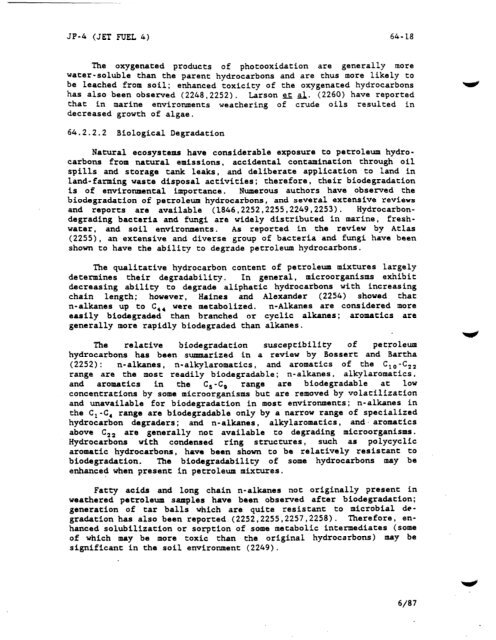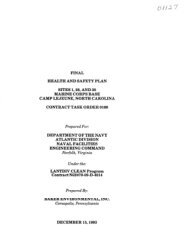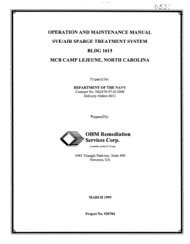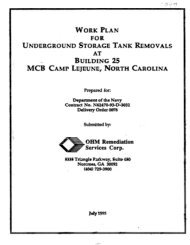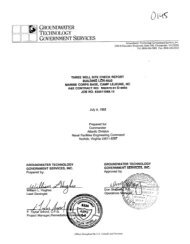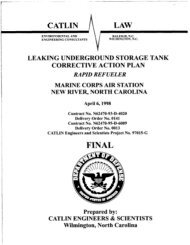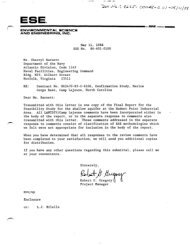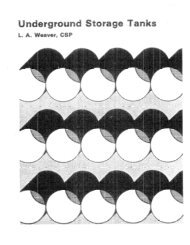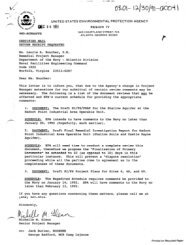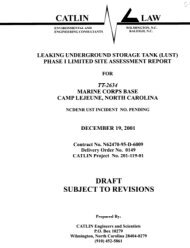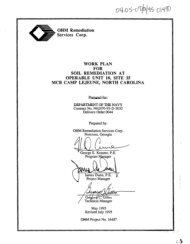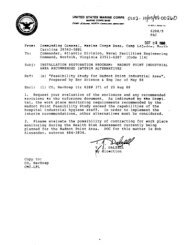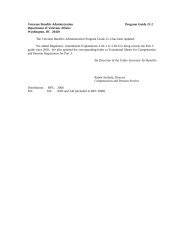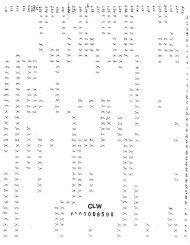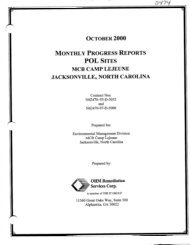health and safety plan solid waste management unit assessment
health and safety plan solid waste management unit assessment
health and safety plan solid waste management unit assessment
Create successful ePaper yourself
Turn your PDF publications into a flip-book with our unique Google optimized e-Paper software.
JP-4 (JET FUEL 4) 64-3.8<br />
The oxygenated products of photooxidation are generally more<br />
water-soluble than the parent hydrocarbons <strong>and</strong> are thus more likely to<br />
be leached from soil; enhanced toxicity of the oxygenated hydrocarbons<br />
has also been observed (2248,2252). Larson et al. (2260) have reported<br />
that in marine environments weathering of crude oils resulted in<br />
decreased growth of algae.<br />
64.2.2.2 Biological Degradation<br />
Natural ecosystems have considerable exposure to petroleum hydrocarbons<br />
from natural emissions, accidental contamination through oil<br />
spills <strong>and</strong> storage tank leaks, <strong>and</strong> deliberate application to l<strong>and</strong> in<br />
l<strong>and</strong>-farming <strong>waste</strong> disposal activities; therefore, their biodegradation<br />
is of environmental importance. Numerous authors have observed the<br />
biodegradation of petroleum hydrocarbons, <strong>and</strong> several extensive reviews<br />
<strong>and</strong> reports are available (1846,2252,2255,2249,2253). Hydrocarbondegrading<br />
bacteria <strong>and</strong> fungi are widely distributed in marine, freshwater,<br />
<strong>and</strong> soil environments. As reported in the review by Atlas<br />
(2255), an extensive <strong>and</strong> diverse group of bacteria <strong>and</strong> fungi have been<br />
shown to have the ability to degrade petroleum hydrocarbons.<br />
The qualitative hydrocarbon content of petroleum mixtures largely<br />
determines their degradability. In general, microorganisms exhibit<br />
decreasing ability to degrade aliphatic hydrocarbons with increasing<br />
chain length; however, Haines <strong>and</strong> Alex<strong>and</strong>er (2254) showed that<br />
n-alkanes up to C,, were metabolized. n-Alkanes are considered more<br />
easily biodegraded than branched or cyclic alkanes; aromatics are<br />
generally more rapidly biodegraded than alkanes.<br />
The relative biodegradation susceptibility of petroleum<br />
hydrocarbons has been summarized in a review by Bossert <strong>and</strong> Bartha<br />
(2252): n-alkanes, n-alkylaromatics, <strong>and</strong> aromatics of the C,,-C,,<br />
range are the most readily biodegradable; n-alkanes, alkylaromatics,<br />
<strong>and</strong> aromatics in the C,-C, range are biodegradable at low<br />
concentrations by some microorganisms but are removed by volatilization<br />
<strong>and</strong> unavailable for biodegradation in most environments: n-alkanes in<br />
the C,-C, range are biodegradable only by a narrow range of specialized<br />
hydrocarbon degraders; <strong>and</strong> n-alkanes, alkylaromatics, <strong>and</strong>. aromatics<br />
above C,, are generally not available to degrading microorganisms.<br />
Hydrocarbons with condensed ring structures, such as polycyclic<br />
aromatic hydrocarbons, hava been shown to be relatively resistant to<br />
biodegradation. The biodegradability of some hydrocarbons may be<br />
enhanced when present in petroleum mixtures.<br />
Fatty acids <strong>and</strong> long chain n-alkanes not originally present in<br />
weathered petroleum samples have been observed after biodegradation;<br />
generation of tar balls which are quite resistant to microbial degradation<br />
has also been reported.(2252,2255,2257,2258). Therefore, enhanced<br />
solubilization or sorption of some metabolic intermediates (some<br />
of which may be more toxic than the original hydrocarbons) may be<br />
significant in the soil environment (2249).<br />
6/87


